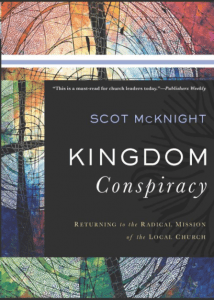The 9th chp in Brian McLaren’s The Secret Message of Jesus concerns global mission. He properly sets the Christian mission in the Jewish context where there was no active mission. McLaren ties the global mission of Jesus to the blessing of Abraham (Gen. 12:4): God’s people are to be a blessing to the nations. Here is an emerging statement about mission: What do you think of Brian’s various proposals that follow?
This global mission theme morphs into the image of the master musician (Jesus) teaching his followers how to play kingdom music and their learning to play that music in this world — and he suggests we need some new artists today. Too many no longer play the music of the kingdom-come-to-earth but play the music of a kingdom up in heaven. This is a regular theme of Brian’s books: he thinks traditional Christianity (esp. Catholicism and Protestant evangelicalism) has focused too much on life after earth.
Chp. 10 begins with an arresting comment: “It was the most religious who seemed to get the secret message of Jesus the least, and the least religious who seemed to get it the most” (81). The kingdom of God was worked out then and still today by ordinary Christians, not just professionals. The true kingdom agents are those, he says, who have an interactive relationship with God and others and who draw others into the kingdom so the world will be changed. He recalls his times in great cathedrals of Europe, where so few attend, and he speaks of that form of the Christian faith as a “sad adventure in missing the point” (85). Great story here about a taxi driver.
In chp. 11 Brian shows that Paul’s original message is comportable with Jesus’ (and I hope emerging critics read this: he does not pit Jesus against Paul). Paul, he says, deals faithfully with Jesus’ message in a new situation. For example, the issue of inclusion with Jesus’ table fellowship and Paul’s understanding of the church are similar. Thus, for Paul, “A new and unprecedented social reality is being created — a new realm, a new network of relationships, a new kingdom” (95). That theme continues in chp. 12: “his letters beging to sizzle and boil with resonance” if you see the scope of Jesus’ message. Paul (and here he sounds like Tom Wright) takes on Caesar with his theological message.
At this point McLaren explores the cross. The peace of Christ comes through a cross, through reconciliation. The goal of Christ’s cross is reconciliation of all. Again, the theme of Paul is the same as with Jesus: the work of God reconciles people to God and to one another. Instead of telling parables like Jesus, Paul is a walking parable.
The secret message of Jesus is not just heard or read but seen in human lives. Writing this chp, Brian tells us, moved him to tears (103).
Tomorrow we look at his chapter on “Getting It, Getting In.”











